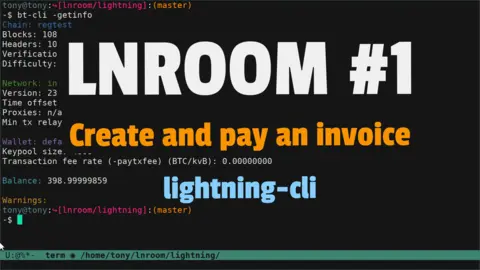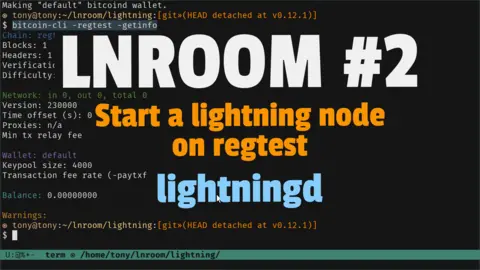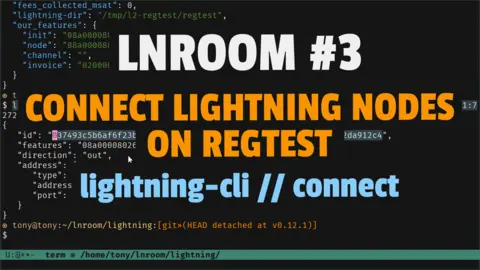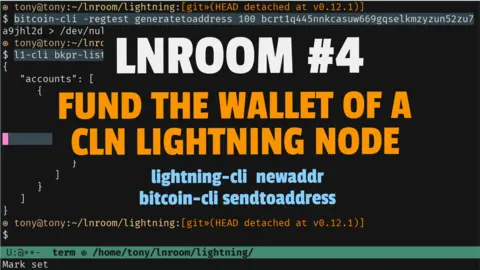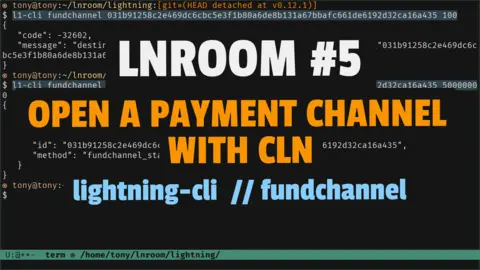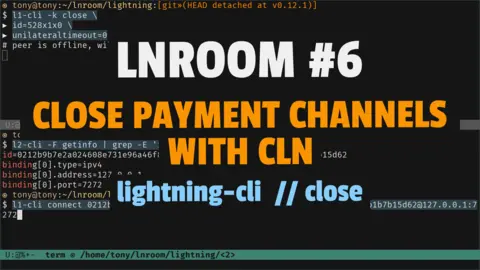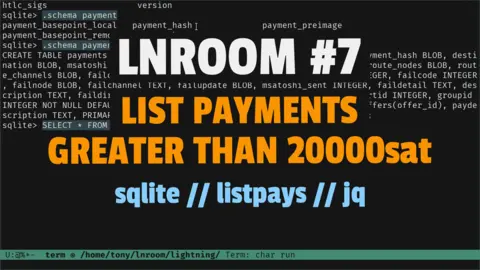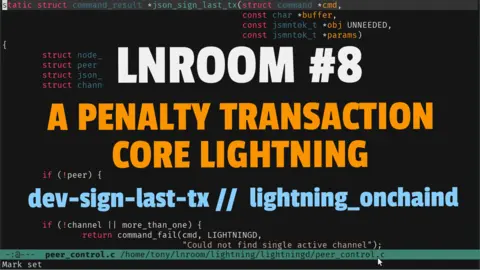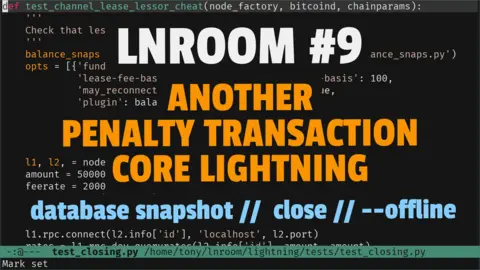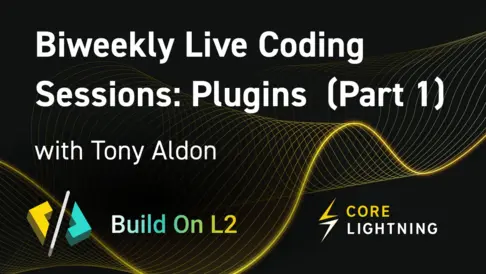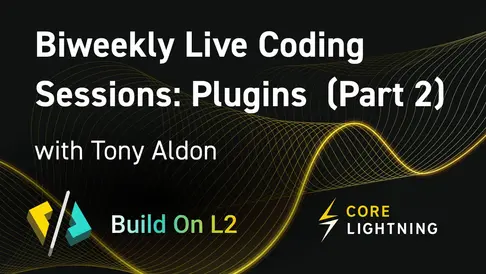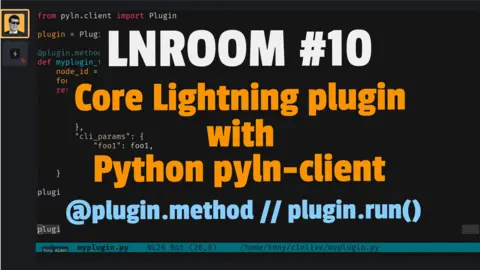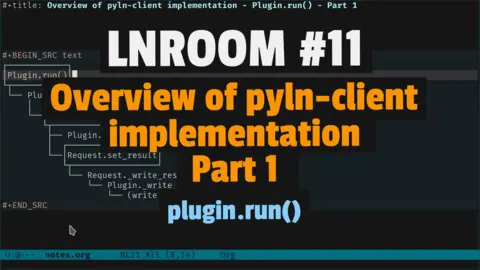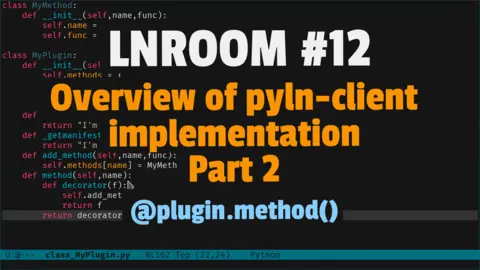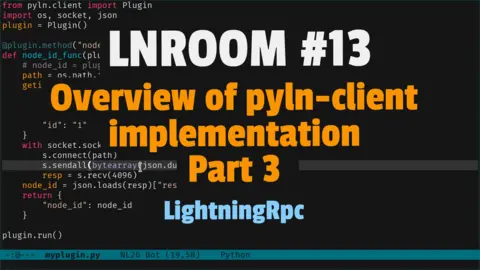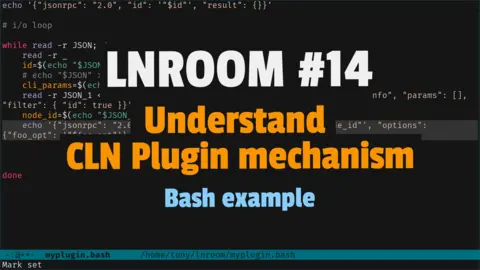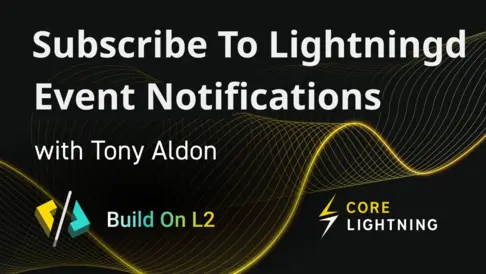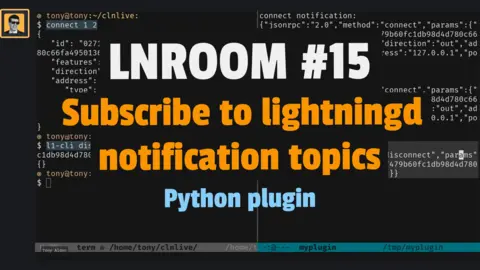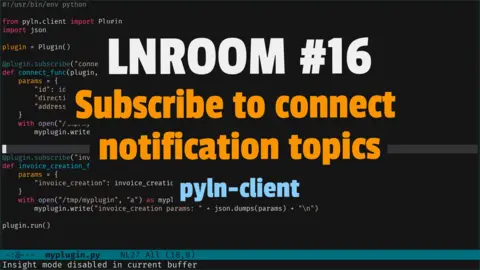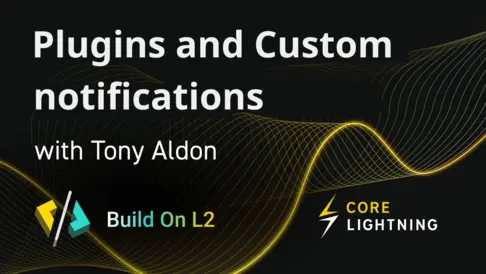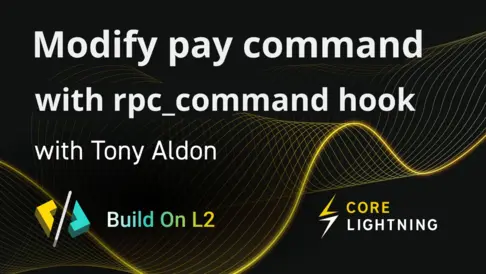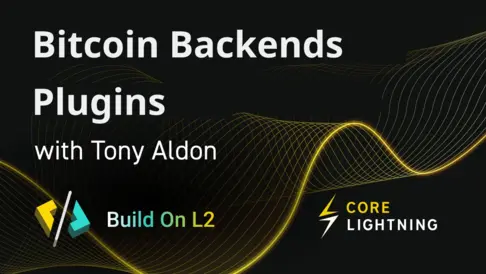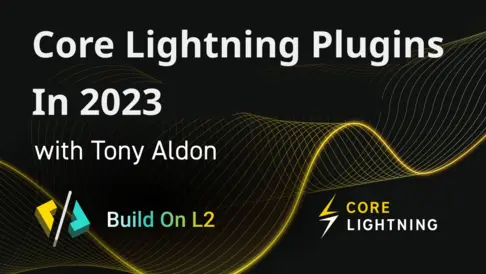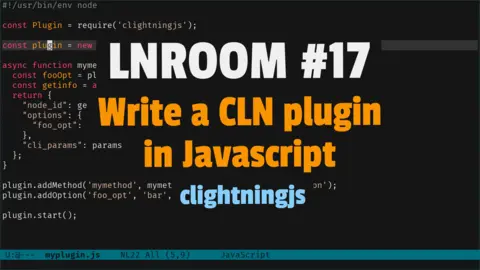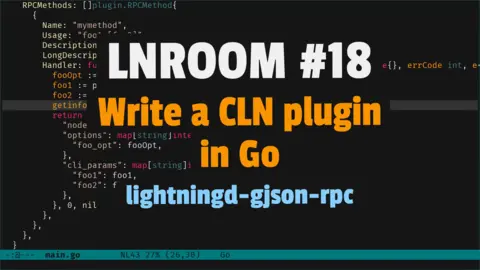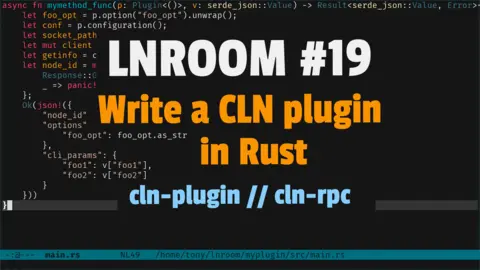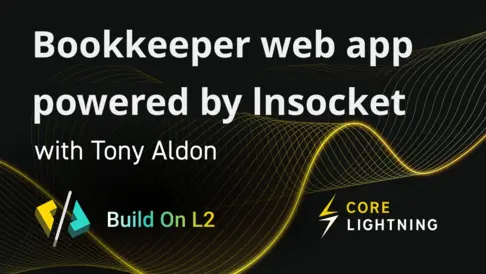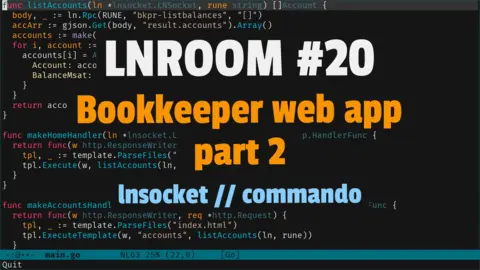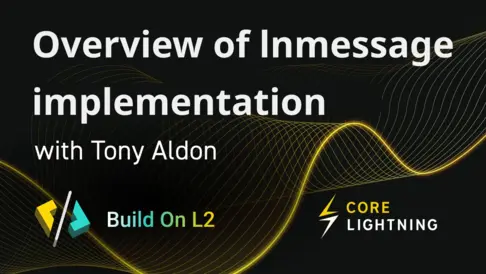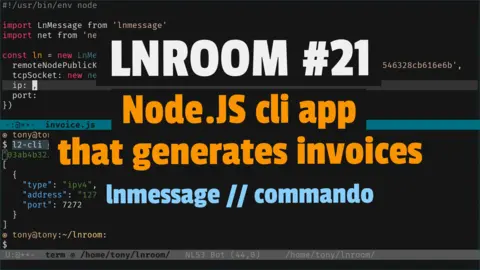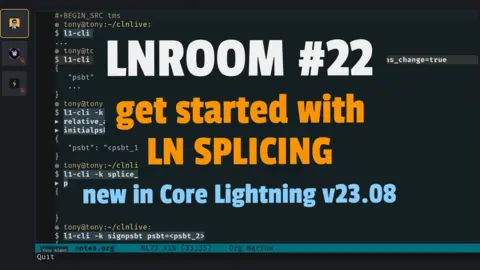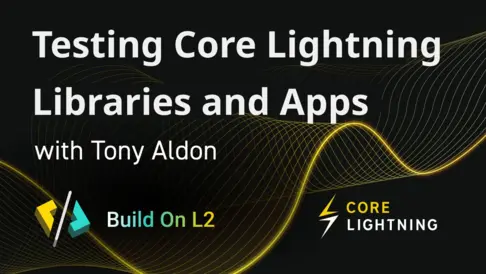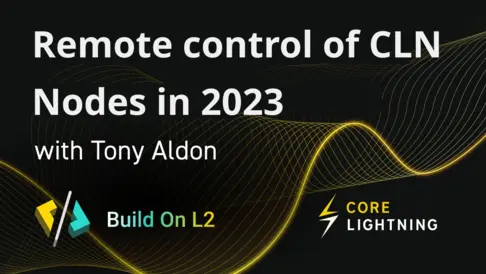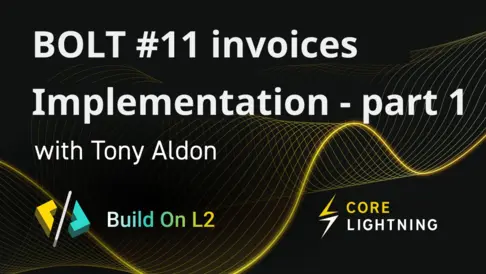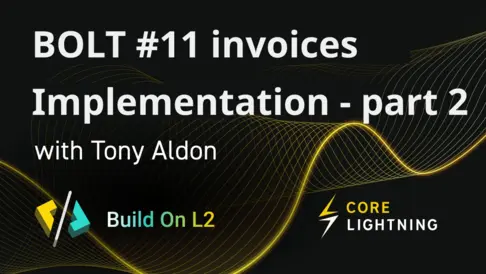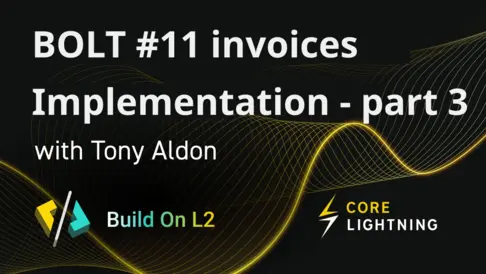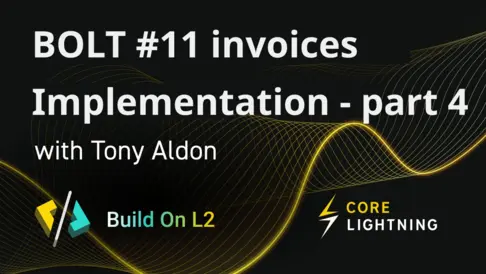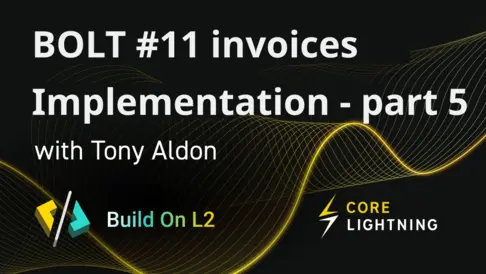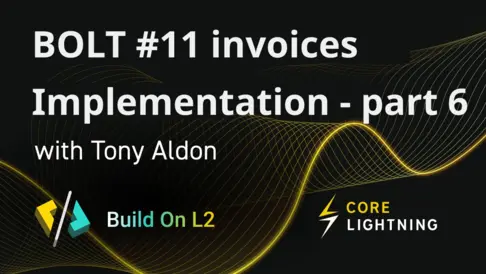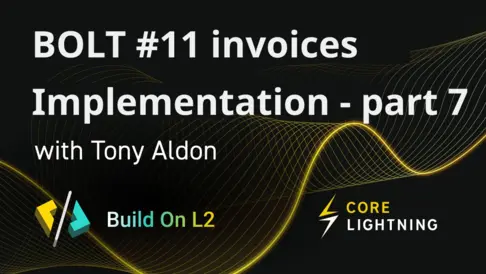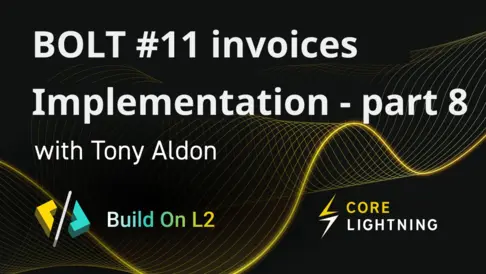Core Lightning plugins in 2023
The idea of this live is (1) to highlight the work that has already been done in CLN plugins space and (2) to inspire new CLN users/programmers to either maintain existing plugins or to write their own.
Note that in this document we try to list "all" that have been done in Core Lightning Plugin space till 2023. Some libraries/plugins may no longer be maintained. Although the live took place in June, we will be adding new material up to December of 2023.

Plugin system
The smallblock Conspiracy
If I understand correctly, the plugin system has been introduced in release [0.6.3] - 2019-01-09: "The Smallblock Conspiracy".
The most important plugin
And the most import plugin ever written (cowsay.sh) has been
introduced with the following pull request: The most important
contrib/ addition, ever. #2985.
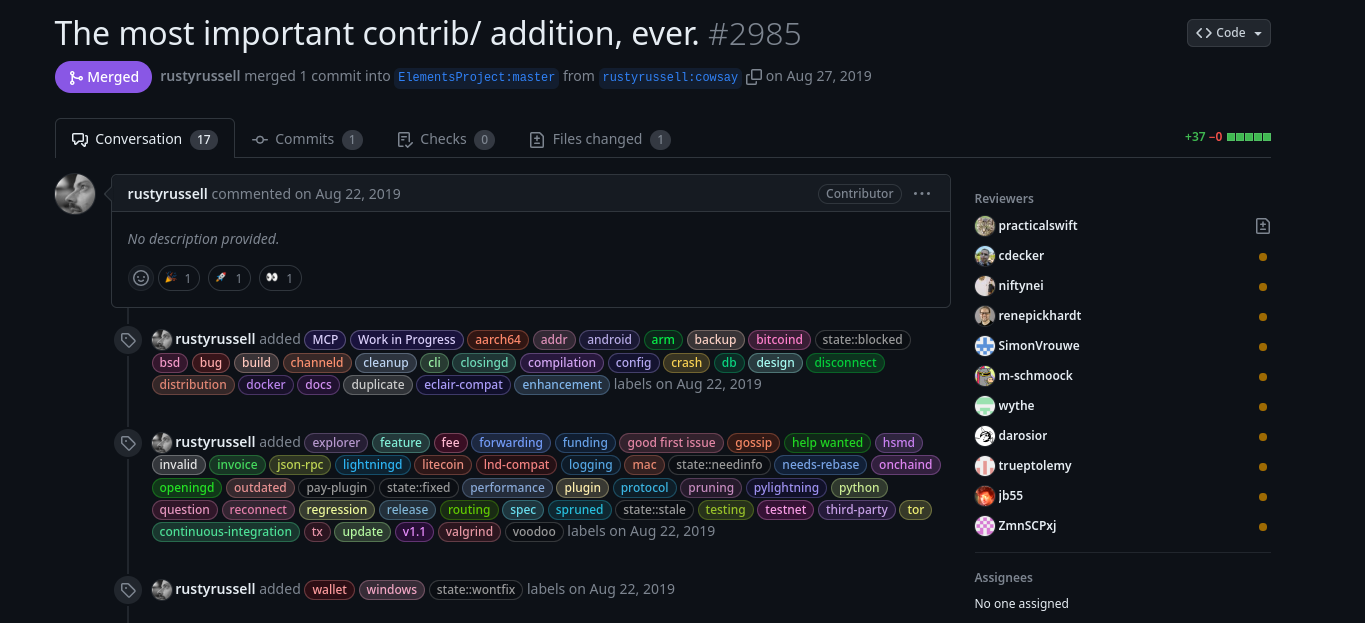
Contribution to lightningd/plugin.c file
◉ tony@tony:~/clnlive/lightning:[git»(HEAD detached at v23.05.2)]
$ git log --oneline --reverse --pretty=format:"%an" lightningd/plugin.c | sort | uniq
arowser
Christian Decker
Conor Scott
darosior
lisa neigut
Michael Schmoock
Richard Bondi
Rusty Russell
Simon Vrouwe
trueptolemy
Vasil Dimov
Vincenzo Palazzo
ZmnSCPxj
ZmnSCPxj jxPCSnmZHow does it work?
Plugins can be written in any languages.
They are started by lightningd and live as subprocesses of lightningd
master process. They read incoming requests from lightningd in their
stdin stream and send responses/notifications to lightningd by writing
to their stdout stream.
When started, plugins reply to a getmanifest request telling
lightningd what they want to register, declare and subscribe to
(startup options, JSON-RPC commands, notification topics and hooks).
Then they receive an init request from lightningd. At that moment,
plugins have complete information about the node, therefore they can
initialize themselves if necessary (starting a webserver for
instance). When they are done they reply to that init request which
tell lightningd that it can proceed.
Finally, plugins start an IO loop waiting for incoming request from
lightningd.
Note that lightningd and plugins use JSON-RPC 2.0 to understand each
other.
Most simple plugin in Bash
The following Bash script foo-plugin.bash implements a CLN plugin that
registers foo-method JSON-RPC method to lightningd. When we call that
method from any client with no argument, it returns the json
{"foo":"bar"}. Note that this uses no specific CLN library and only
depends only on jq command for convenience:
#!/usr/bin/bash
set -e
# getmanifest
read -r JSON
read -r _
id=$(echo "$JSON" | jq .id)
echo '{"jsonrpc": "2.0", "id": '"$id"', "result": {"dynamic": true, "options": [], "rpcmethods": [{"name": "foo-method", "usage": "", "description": "description"}]}}'
# init
read -r JSON
read -r _
id=$(echo "$JSON" | jq .id)
echo '{"jsonrpc": "2.0", "id": '"$id"', "result": {}}'
# i/o loop
while read -r JSON; do
read -r _
id=$(echo "$JSON" | jq .id)
echo '{"jsonrpc": "2.0", "id": '"$id"', "result": {"foo": "bar"}}'
doneThe plugin can be started like this
◉ tony@tony:~/clnlive:
$ lightning-cli plugin start $(pwd)/foo-plugin.bashand foo-method command can be called using lightning-cli RPC client
like this:
◉ tony@tony:~/clnlive:
$ lightning-cli foo-method
{
"foo": "bar"
}Most simple plugin in Python using pyln-client plugin library
Now, if we use a plugin library to write plugins, all the plumbing
goes away and we can focus on our use case. For instance the previous
foo-plugin.bash plugin would be written in Python using pyln-client
library like this:
#!/usr/bin/env python3
from pyln.client import Plugin
plugin = Plugin()
@plugin.method("foo-method")
def foo_method_func(plugin):
return {"foo": "bar"}
plugin.run()Installing plugin
Manually,
lightning:doc/reckless.7.md: Reckless is a plugin manager for Core-Lightning. Typical plugin installation involves: finding the source plugin, copying, installing dependencies, testing, activating, and updating the lightningd config file,
coffee-tools/coffee: Reference implementation for a flexible core lightning plugin manager.
See also:
pyln-testing / pyln-client
The Python library pyln-client is a plugin library and also a JSON-RCP
client that let you talk to lightningd.
It is maintained by Core Lightning team.
Many plugins are written with that library and part of CLN tests uses
it along with pyln-testing.
See:
Libraries to write plugins
C:
Go:
ElementsProject/glightning: a c-lightning plugin driver and RPC client,
niftynei/glightning: A Golang driver for c-lightning. Includes both an RPC client and plugin framework,
vincenzopalazzo/cln4go: A core lightning library written in Go 1.18 for real gopher,
fiatjaf/lightningd-gjson-rpc: Talk with a lightningd/c-lightning with minimal overhead and gjson responses.
Javascript:
lightningd/clightningjs: C-lightning plugins in Javascript,
joelklabo/cln-plugin-js: write CLN plugins in JS,
shesek/lightning-client-js: JavaScript c-lightning client,
BHBNETWORK/lightning-client-js: JavaScript c-lightning client,
joelklabo/cln-file-logger: A logging utility that works with Core Lightning plugins, can log to stdout and a file,
runcitadel/core-ln.ts: A simple, easy-to-use c-lightning client framework in TypeScript.
Rust:
cln-rpc: native bindings to the JSON-RPC interface, used for things running on the same system as CLN.
cln-plugin: a library that facilitates the creation of plugins in Rust, with async/await support, for low-footprint plugins.
cln-grpc: of course, the library used to create the gRPC plugin can also be used directly as a client library.
laanwj/cln4rust: Crate that provides an RPC binding from rust code to the c-lightning daemon,
sgeisler/clightning-plugin-api: Rust API for c-lightning plugins Build Status.
Java:
clightning4j/JRPClightning: Java framework for C-Lightning to work with the RPC interface, and also the library simplifies the work to develop custom plugins with Java, Kotlin, and all the languages that supports the Java dependencies.
CPP:
darosior/lightningcpp: C-lightning plugins and RPC library.
Zig:
vincenzopalazzo/cln4zig: core lightning RPC wrapper written in zig language.
Haskell:
AutonomousOrganization/clplug: Create Core Lightning plugins in haskell.
PHP:
analogic/clightning: PHP client for raw RPC c-lightning.
Dart:
dart-lightning/lndart.cln: Dart framework for Core Lightning to work with the RPC interface.
.Net:
joemphilips/DotNetLightning: Utility to work with Lightning network with .NET.
Template
lightningd/template: c-lightning Project Template.
clightning4j/kotlin-template: A minimal template for projects based on JRPClightning. This should get you started if you want to develop a core lightning plugin using Kotlin,
joelklabo/cln-plugin-js-starter: for js plugins,
coffee-tools/cln4go.plugin: for go plugins.
Builtin plugins
Current builtin plugins:
In release 23.08 the plugins renepay and clrest have been added:
In the source code we can also find the two following plugins:
Plugins (not builtin)
Backup
plugins:backup/README.md: This plugin will maintain clean database backups to another location. It uses the `db_write` hook to make sure to always have a backup that is not missing any state updates and is not potentially harmful.
Bitcoin backends
clightning4j/esplora_clnd_plugin: Using @Blockstream Esplora web explorer to fetch bitcoin data for clightning.
coffee-tools/folgore: Universal Bitcoin backend for core lightning with BIP 157 support full based on the btcli4j Kotlin plugin! Ah, yes it is written in Rust.
clightning4j/btcli4j: It is a core lightning plugin to override Bitcoin backend plugin with esplora by Blockstream and give the possibility to make the running process with bitcoind in pruning mode more solid.
plugins:sauron/README.md: A Bitcoin backend plugin relying on Esplora.
nbd-wtf/trustedcoin: A lightningd plugin that replaces bitcoind with trusted public explorers.
andrewtoth/rust-bcli: A CoreLightning bitcoin backend plugin written in rust to replace the built-in bcli.
Start9Labs/c-lightning-pruning-plugin: This plugin manages pruning of bitcoind such that it can always sync.
Channels
ElementsProject/peerswap: PeerSwap allows two different types of swaps: swap-in / swap-out.
nbd-wtf/poncho: This is an early alpha software that turns your CLN node into a hosted channels provider.
justinmoon/clhwi: C-Lightning Plugin to Fund Channels w/ Hardware Wallets.
plugins:autopilot/README.md: This is a version of Rene Pickhardt's Autopilot library ported as a Core-Lightning plugin.
renepickhardt/lightning-network-autopilot: A python library that uses data science and statistical methods to make recommendations for channel management of lightning network node operators.
daywalker90/summars: A core lightning plugin to show a summary of your channels and optionally recent forwards.
rsbondi/multifund: c-lightning plugin to fund multiple channels with a single transaction.
kristapsk/lightning-channelbalance: channelbalance plugin for c-lightning.
ZmnSCPxj/clboss: Automated Core Lightning Node Manager.
ZmnSCPxj/cldcb: C-Lightning Dynamic Channel Backup.
plugins:rebalance/README.md: This plugin moves liquidity between your channels using circular payments.
plugins:persistent-channels/README.md: The persistent channels plugin allows you to describe a number of channels you'd like to have open at any time and the plugin will attempt to maintain that state.
plugins:drain/README.md: This plugin drains or fills up the capacity of one of your channel using circular payments to yourself.
plugins:jitrebalance/jitrebalance.py: JIT rebalancing of channels.
plugins:feeadjuster/README.md: This plugin dynamically adjusts fees according to channel balances.
fiatjaf/vhc: c-lightning hosted channels plugin in V.
giovannizotta/circular: Core Lightning plugin that helps routing nodes rebalance their channels.
plugins:monitor/README.md: Monitors the health of your peers and helps you to decide if you might want to close a channel.
daywalker90/sling: A core lightning plugin to automatically rebalance multiple channels.
toneloc/stable-channels: p2p stable channels on the Bitcoin Lightning Network.
Bookkeeper
chrisguida/watchdescriptor: watchdescriptor is a Rust-based CLN plugin that allows CLN's bookkeeper plugin to track coin movements in external descriptor wallets, enabling businesses to obtain a complete picture of all bitcoin inflows and outflows.
Events / notifications
flitz-be/lightningd-redis-publisher: Publish C-Lightning events to redis.
rbndg/c-lightning-events: Subscribe to C-Lightning events with websocket.
yukibtc/cln-ntfy: CLN plugin for ntfy.
vincenzopalazzo/crab.rs: Crab: a rust plugin for core lightning able to manage a notify system.
fiatjaf/lightningd-webhook: A lightningd plugin that emits webhooks for each notification events.
plugins:zmq/README.md: This module forwards notifications to ZeroMQ endpoints depending on configuration.
HTTP APIs / access to CLN
rsbondi/clightning-rest: A rest plugin for clightning.
Start9Labs/c-lightning-http-plugin: A plugin for c-lightning that proxies http rpc traffic to the unix domain socket.
Ride-The-Lightning/c-lightning-REST: REST APIs for Core Lightning written with node.js.
clightning4j/jrest: A Java plugin for c-lightning to expose the API over rest!
willcl-ark/lightning-macaroons: c-lightning RPC macaroons.
nettijoe96/c-lightning-graphql: graphql api plugin for c-lightning.
nettijoe96/jwt-factory: Json Web Tokens (JWT) to provide auth for c-lightning plugins.
vincenzopalazzo/cln-remote-api: Rust Remote API for core lightning provided as library and a plugin.
jb55/cln-core-rpc: expose bitcoin-core rpcs as clightning rpcs.
Invoices
AutonomousOrganization/freeze: Hold invoices for core lightning.
hodlinvoices (niftynei): How to hodlinvoices on @Core_LN?
lnplay.live-plugin: Core Lighting plugin for https://lnplay.live. Developed for the tabconf2023 hackathon. The RPC method
lnplaylive-createorderis called by the front end web app to get an invoice for a product andlnplaylive-invoicestatusrpc method returns the status of a BOLT11 invoice.
Lightning network
endothermicdev/impscan: CLN plugin to scan for active implementations on the lightning network.
plugins:probe/README.md: This plugin regularly performs a random probe of the network by sending a payment to a random node in the network, with a random `payment_hash`, and observing how the network reacts.
niftynei/sitzprobe: sitzprobe is a c-lightning plugin that actively sends test payments through the lightning network.
plugins:historian/README.org: The historian plugin aims to provide tools to archive the Lightning Network gossip messages and to work with the archived messages.
AutonomousOrganization/fgln: Plugin and library that uses graph Library fgl to load lightning network into functional data structure and create some convenience functions (in progress).
litch/spaz: This is a CLN plugin to make a fairly randomly spazzy node in a network.
LNURL
elsirion/clnurl: Core Lightning plugin for LNURL and LNAddress support.
LSP
breez/lspd: lspd is a simple deamon that provides LSP services to Breez clients. This is a simple example of an lspd that works with an LND node or a CLN node. The CLN plugin is defined in the subdirectory
cln_plugin.
Messages
plugins:noise/README.org: The Noise plugin allows sending and receiving private messages through the Lightning Network.
bitonic-cjp/lightning-message-demo: This software demonstrates how data can be sent along with Lightning payments, from payer to payee.
Metrics / summaries
LNOpenMetrics/go-lnmetrics.reporter: Reference implementation written in Go to collect and report of the lightning node metrics.
plugins:prometheus/README.md: This plugin exposes some key metrics from c-lightning in the prometheus format so it can be scraped, plotted and alerts can be created on it.
kristapsk/lightning-feereport: feereport plugin for c-lightning.
AutonomousOrganization/summy: Summarize Core Lightning status with rpc calls and forward logs.
0xB10C/c-lightning-plugin-csvexportpays: A c-lightning plugin that exports all payments to a CSV file.
plugins:summary/README.md: This plugin is a little hack to show a summary of your node, including fiat amounts.
jb55/clightning-offer-summary: a clightning plugin that summarizes paid offer invoices.
kristapsk/lightning-walletbalance: walletbalance plugin for c-lightning.
munin-clightning: These plugins offer visualization for channels, CLN logs, feerates, fees, funds, invoices and payments.
Monitoring
daywalker90/vitality: Core lightning (CLN) plugin to watch channel health, gossip health and ping amboss for online status.
Nostr
joelklabo/nostr-control: A CLN Plugin you can interact with over Nostr DM.
joelklabo/nostrify: Core Lightning plugin that sends events to Nostr.
thesimplekid/cln-nostr-wallet-connect: Core Lightning plugin for nostr wallet connect.
thesimplekid/cln-zapper-rs: Core Lightning plugin for sending zap events.
Pay / Payments
daGoodenough/bolt12-prism: CLN plugin for lightning prisms using BOLT 12.
andrewtoth/paythrough: CoreLightning plugin to pay through a specific channel.
plugins:paytest/README.org: A plugin to benchmark the performance of the pay plugin. It can generate mock invoices for remote nodes, and it can hold on to incoming test multi-part payments as if they were real payments.
ZmnSCPxj/payz: Plugin for an alternative to the normal C-Lightning pay algorithm.
fiatjaf/trampoline: Trampoline payments plugin for c-lightning.
dart-lightning/kraken: Kraken is a plugin for Core Lightning that helps you analyze payment failure and try to procude a suggestion.
UI
darosior/lightning-qt: lightning-qt is a Python plugin for C-lightning, a Lightning Network daemon. It enables the use of a bitcoin-qt-like Graphical User Interface (actually, part of the icons and forms have been taken from bitcoin-qt and modified) via the RPC interface.
Watchtower
talaia-labs/rust-teos: The Eye of Satoshi - Lightning Watchtower.
Others
plugins:currencyrate/README.md: This plugin provides Bitcoin currency conversion functions using various different backends and taking the median. It caches results for an hour.
plugins:datastore/README.md: The next version of c-lightning (0.10.2?) has a built-in datastore. Until then, this plugin serves the same purpose, and has the same interface.
rsbondi/clightning-dotnet-plugin: Hello world plugin in csharp
plugins:donations/README.md: This plugin enables c-lightning nodes to start one or several small webserver via the command line on specified port. The webserver is based on flask and exposes the invoice API call.
plugins:helpme/README.md: This plugin is designed to walk you through setting up a fresh Core-Lightning node, offering advice for common problems.
clightning4j/LNQrcode: It is a plugin for c-lightning to display a QR code on a View!
jb55/clightning-discovery: clightning dns-sd auto-discovery plugin
andrewtoth/broadcast-over-tor: Privacy enhancing CoreLightning plugin which broadcasts all on-chain transactions to random nodes over tor.
andrewtoth/listmempoolfunds: CoreLightning plugin to track unconfirmed funds.
kristapsk/c-lightning-lnd-plugins: Plugins for c-lightning emulating some commands of LND (lncli).
AI4ALL: Build an AI enabled 'helpme' Plugin for Core Lightning: Build an AI enabled version of the helpme plugin for the Core Lightning (a Bitcoin Lightning Network Node implementation) command line tool.
Resources
conscott/c-lightning-plugins: A collection of plugins for c-lightning.
jb55/awesome-core-lightning: A list of awesome CLN projects and plugins.
lightningd/plugins: Community curated plugins for core-lightning.
renepickhardt/c-lightning-plugin-collection: A collection of c-lightning plugins which are ready to use for your lightning network node.
rsbondi/clightning-go-plugin: A collection of plugins for use with clightning written in go using glightning:
remoteRPC: This plugin allows you to access all RPC commands using HTTP instead of the default of unix socket,
stats: Shows some additional stats, currently shows forwarding info by channel, amount earned, percent gain etc..
dumpkeys: Export xpriv/xpub,
setban: ban peers for specified time.
Videos
Rusty Russell
Advanced c-lightning Node Customization: Dangerous Hooks:
how to ban a command,
how to extend the
invoicecommand such that we can pass the amount in cents to the command,how to require a password to run the JSON-RPC commands,
how to replace a command by another.
Rusty Russell - JSON Interface with c-lightning and Writing Extensions:
plugin system with a shell example plugin,
pylightning Python library,
write plugin that create an invoice when we visit,
http://localhost:5000url and show the invoice in the browser.
Rusty Russell | Getting Started with c-lightning Webinar | February 17 2021:
helpme.py plugin,
summary.py plugin,
currencyrate.py plugin.
Christian Decker
Protocol Development Using c-lightning:
how we can use Core Lightning and its exposed interfaces to build some prototypes for LN protocol,
sendcustommsg,createonion,sendonionRPC commands,pyln-client, pyln-testing,
building a chat app,
Christian Decker - the c-lightning API: plugin system.
Lisa Neigut
c-lightning 0.9.2: Notifications | Lisa Neigut | December 3 2020:
notifications,
writing a plugin with pyln-client,
tests/plugins/notify.py (in lightning).
Core Lightning Plugin: Bookkeeper: builtin bookkeeper plugin.
Lisa Neigut and Aditya Sharma
Core Lightning Plugin: Chanbackup: chanbackup plugin.
Antoine Poinsot
Antoine Poinsot - c-lightning plugins:
Core Lightning design,
how plugins work,
Why plugins are great,
Rene Pickhardt
Kody Low
Let's Build Sauron: Running a Lightning Node from a Repl:
bitcoin backend plugin Sauron,
Installing it and how does it works.
#Ai4ALL / Let's Build Sauron: Running a Lightning Node from a Repl (condensed)
bounty for building an CLN plugin helpme using AI,
sauron bitcoin backend plugin,
helpme plugin,
pyln-client.
Sergi Delgado and Conor Okus
Deploying an Eye of Satoshi Lightning Watchtower:
the deployement of a test network with two CLN nodes and a watchtower using Polar,
the installation of The Eye of Satoshi watchtower,
the installation of
watchtower-clientplugin for CLN andsome basic interactions between a node and the watchtower.
402 Payment Required
-
summary plugin,
backup plugin and with file in another server using NFS file system.
Vincenzo Palazzo
Highlight: Write a clever plugin manager written in rust for core lightning
Live coding writing a PR for a CLN plugin manager.
Shahana Farooqi
clnrest Latest Features with Shahana: Become better at controlling your CLN node by using clnrest to its fullest potential. Join Blockstream Front-End Engineer Shahana Farooqi to find out more about recent improvements as well as:
clnrest usage in applications
rune validation
certificate generation
configuration options
automated tests
Damian
Learn everything you need to add custom functionality to your node by writing plugins for CLN:
LNROOM
Biweekly live coding sessions - CLN on BOL2
Understand CLN Plugin mechanism with a Python example: In this live, we add the method
mypluginto Core Lightning by writing a dynamic Python plugin calledmyplugin.py. Doing this, we try to understand: (1) how startup options are passed to the plugin, (2) how cli parameters are passed to the plugin and (3) how to communicate to the lightning node via JSON-RPC over unix sockets.Register a JSON-RPC method to Core Lightning using pyln-client Python package: In this live, we register a JSON-RPC method in Core Lightning using
pyln-clientPython package. Aspyln-clientuses Python decorators to declare JSON-RPC methods, in the second part we try to understand how they work by playing with 2 examples, the second one being very close to the waypyln-clientuses them.How to write tests for CLN plugins: In this live, we use
pyln-testingPython package to write a test for a simple Core Lightning plugin written withpyln-clientPython package. We do it in a TDD style.Learn how to subscribe to lightningd event notifications with CLN plugins: In the first part of this live we write a Python plugin without
pyln-clientpackage which subscribes to the notification topicsconnectanddisconnect. A benefit of doing it like this is that it allows us to understand how the system works. Another benefit is that the way we write the plugin can be applied to any other languages. In the second part we do it again with Python but this time usingpyln-clientpackage.How Core Lightning plugins can communicate with each other?: In this live we implement a plugin that emits custom notifications
footolightningdand another plugin which subscribes to those custom notificationsfoo. We do it with Python only and also withpyln-clientpackage.Core lightning rpc_command hook, pay command and BOLT11 invoice: In this live we write a plugin that limits the amount a node can send (using the builtin
paycommand) to a BOLT11 invoice. This is possible thanks to Core Lightning hook system and specifically the hookrpc_command.How does Core Lightning communicate with the Bitcoin network?: In this live we install
trustedcoinplugin that replacesbitcoindwith trusted public explorers. Then we look atlightningd/bitcoind.cfile which defines a standardized interface for talking and gathering Bitcoin data using any Bitcoin backend plugin. Finally, we see howtrustedcoinuses public Esplora instances to implement the JSON-RPC methodgetrawblockbyheight.
LNROOM
Start writing Core Lightning plugins with pyln-client TODAY!: In this episode, we register a JSON-RPC method in Core Lightning using
pyln-clientPython package.Overview of pyln-client implementation - Plugin.run() - Part 1: In this episode, we look a
pyln-clientPython package implementation focusing specifically on the methodrunof the classPlugin.Overview of pyln-client implementation - @plugin.method() - Part 2: In this episode, we look a
pyln-clientPython package implementation focusing specifically on the methodmethodof the classPlugin. We write a very simplified version ofMethodandPluginclasses to understandplugin.method().Overview of pyln-client implementation - LightningRpc - Part 3: In this episode, we look a
pyln-clientPython package implementation focusing specifically onLightningRpcclass. This class implements a RPC client for thelightningddaemon. This RPC client connects to thelightningddaemon through a unix domain socket and passes calls through.Understand CLN Plugin mechanism with a Bash example: In this live, we add the method
mymethodto Core Lightning by writing a dynamic Bash plugin calledmyplugin.bash. Doing this, we try to understand: (1) how startup options are passed to the plugin, (2) how cli parameters are passed to the plugin and (3) how to communicate to the lightning node via JSON-RPC over unix sockets.Subscribe to lightningd notification topics with a Python plugin: In this episode we write a Python plugin without
pyln-clientpackage which subscribes to the notification topicsconnectanddisconnect. A benefit of doing it like this is that it allows us to understand how the system works.Subscribe to connect notifications with pyln-client: In this episode we write a Python plugin with
pyln-clientpackage which subscribes to the notification topicsconnectandinvoice_creation.Write a Core Lightning plugin in Javascript: In this episode, we write a Core Lightning plugin in Javascript that registers a JSON-RPC method. To do so we use
clightningjsJavascript package.Write a Core Lightning plugin in Go: In this episode, we write a Core Lightning plugin in go that registers a JSON-RPC method. To do so we use
lightningd-gjson-rpcGo module.Write a Core Lightning plugin in Rust: In this episode, we write a Core Lightning plugin in Rust that registers a JSON-RPC method. To do so we use
cln-pluginandcln-rpcRust crates.Getting started with CLNRest plugin: In this live we see how to start and use the new builtin plugin CLNRest that transforms RPC calls into a REST service. We learn how to use the Swagger interface to generate/send http requests. Then we connect to the websocket offered by CLNRest that sends lightningd notification. Finally, we take a look at CLNRest implementation to show how plugin developers can take advantage of the new JSON RPC method
checkrune.Get started with cln-grpc plugin: In this live we continue our tour about Core Lightning remote control with the builtin plugin
cln-grpc. We write a Python application which generates invoices on our CLN node using the gRPC protocol.
Short clips
A foo/bar CLN plugin example written with pyln-client!: A foo/bar CLN plugin example written with pyln-client!
wait_for_log is what you're looking for!: You want to test your CLN plugin and have to wait for something to be written in the node's log before continuing.
wait_for_logis what you're looking for!Do you want to be notified by lightningd each time you connect to a peer?
custom notifications: With custom notifications, CLN plugins can communicate with each other! BOOM!!!
Pizzas can be really expensive:
rpc_commandhookHow to mess up your Core Lightning node with class:
rpc_commandhook
Learning
Lightning: BOLTs in a flash by Base58: Want to really understand how lightning works? Join us for an in-depth and hands on, project based investigation of building lightning channels, making payments, finding routes, and making onions. By the end of this class you'll have implemented a hodl-invoice plugin, bolt11 invoice decoder, an onion packager, and a routing algorithm that can parse through gossip to find a route. [...] We'll use Core Lightning Plugins to manually HODL invoices, build onions for routes, and understand gossip messages.
Articles
Five plugins every node runner should know: CLN is awesome because out of the box it's a minimal yet high-performance LN node implementation that is customizable with its plugin architecture. Plugins allow you to easily add features to your CLN node such as a watchtower, autopilot, and various other quality of life improvements that make your life as a node op easier. Here are five plugins every node operator should know
Plugging into c-lightning: the future of lightning plugins is bright: [...]_In contrast, c-lightning offers a third way. It maintains a robust and secure core that is designed to not be tweaked or replaced by the developer. Flexibility and additional functionality is available through the use of plugins that can be written by the developer in various languages such as Python or Go. The aim is for the c-lightning ecosystem to emerge as a testbed for experimenting with new cutting edge features, previously the terrain of other implementations such as lnd and eclair, without sacrificing the performance and robustness of the core.
Run c-lightning in a light and resilient way: If you are here, means that you are searching for a light method to run a lightning node with c-lightning, and possibly in a reliant way.
